In the years 1934-1935, Louis Even was working at Garden City Press, in Saint Anne de Bellevue, Quebec. He was a very talented man and, above all, an apostle. He was working in an efficient way for the promotion of workers by giving them evening classes, after having worked for hours as a typographer and a foreman. It is during this period that he discovered Social Credit by reading J.C. Larkin’s booklet “From Debt to Prosperity.” “Here’s a great light in my life, everybody must be acquainted with it,” Louis Even said. He had just discovered how to solve the economic depression, which was the cause of so many hardships. He started with giving lectures all over Quebec, in the evenings and on the weekends. He translated articles on Social Credit which were published in Garden City Press’s periodicals — “The Instructor” and its French-language version, “Le Moniteur.” In 1936, he founded “Les Cahiers du Crédit Social,” which were sold for 5 cents each, and which he gave away more often than not. In March, 1937, Gilberte Côté joined Louis Even to also spread the brilliant Social Credit doctrine. In 1938, Louis Even left his job for good, and consequently gave up his salary, right in the mdist of the Depression, to spread the Social Credit idea through the apostolate, begging for his nights’ lodgings and meals.
Th.T.
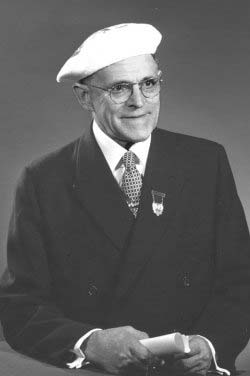 Louis Even, the founder of the “Michael” Journal Louis Even, the founder of the “Michael” Journal |
The first issue of the “Vers Demain” Journal, founded by Louis Even and Gilberte Côté, was published in Canada in September,1939 (its English-language version, now called “Michael”, was first published in 1953). So the “White Berets” have been travelling all over Canada and the world for the last 63 years, to bring to the population the message of the “Vers Demain” and “Michael” Journals.
But what is precisely the message carried by this journal? Why has this periodical been founded? What were the intentions, the objectives of its founders? This message, this objective, is still the same in 2004 as in the beginning, in 1939: to promote the development of a better world, a more Christian society, through the diffusion and the implementation of the teaching of the Roman Catholic Church, in every sector of society. The pursuit of a better world: it is precisely for this reason that the founders of this paper called it “Vers Demain” (Towards Tomorrow); they wanted to build a future that is better than today.
Louis Even was himself a great Catholic, and he was convinced that a better world could be built only upon the eternal principles of the Gospel and upon the teachings of His Church — the Roman Catholic Church — whose visible head on earth is the Sovereign Pontiff, who is presently John Paul II.
Moreover, the objectives of the “Michael” and “Vers Demain” Journals are clearly set out on the front page of every issue, just below the logo. One can read, on the left: “A Journal of Catholic Patriots, for the Kingship of Christ and Mary, in the souls, families and countries.” And on the right: “For a Social Credit Economy, in accordance with the teachings of the Church, through the vigilant action of heads of families, and not through political parties” (which means, among other things, that the “Social Credit” philosophy that is referred to here has nothing to do with political parties, not even so-called “Social Credit parties”, but it is simply an economic reform that can be applied by any political party in power).
“Michael” is therefore a journal of Catholic patriots, that also deals with an economic reform, with “Social Credit.” Why? “What does this have to do with religion?” some might ask. The “Social Credit” system is nothing but a method, a way to apply the Church's social doctrine, which is an integral part of the teaching of the Church. So in this, the “Michael” Journal does not move away from its first objective, which is “to promote the development of a more Christian society through the diffusion of the teaching of the Roman Catholic Church.”
If the Church intervenes in social matters, and has developed a set of principles that came to be called the “social doctrine of the Church”, it is essentially because, as Pope Benedict XV said, “it is on the economic field that the salvation of souls is at stake.” His immediate successor, Pope Pius XI, also wrote:
“It may be said with all truth that nowadays the conditions of social and economic life are such that vast multitudes of men can only with great difficulty pay attention to that one thing necessary, namely their eternal salvation.” (Encyclical Letter Quadragesimo Anno, May 15, 1931.)
Pius XII also used similar words, in his June 1, 1941 radio-broadcast: “How could the Church — a so loving Mother who cares about the well-being of her sons — be permitted to remain indifferent when she sees their hardships, to remain silent or pretend not to see and not to understand social conditions which, voluntarily or not, make it difficult and practically impossible a Christian conduct in conformity with the Commandments of the Sovereign Lawgiver?” And thus all of the Popes speak, including John Paul II today.
The fact that countless souls are lost because of the present economic conditions is easy to understand: man needs a minimum of material goods to live his short pilgrimage on earth, for while God created man with an immortal soul, He also created him with material needs: food, clothing, and shelter. But in order to get food, clothing, and shelter, man must have money to purchase them; otherwise, goods will rot on the shelves, and the pauper will starve to death.
In other words, money is the license to live for the individual: having no money means certain death in a short term. Those who hold the power to create money — the Bankers — therefore literally control our lives, as Pope Pius XI rightly put it in his Encyclical letter Quadragesimo Anno, in 1931:
“This power becomes particularly irresistible when exercised by those who, because they hold and control money, are able also to govern credit and determine its allotment, for that reason supplying, so to speak, the lifeblood to the entire economic body, and grasping, as it were, in their hands the very soul of production, so that no one dare breathe against their will.” A little further, the Pope added that “the State has become a slave, bound over to the service of human passion and greed,” to the service of the money powers.
This control of money by private interests is the greatest swindle of all times, and it has brought about an incalculable number of disastrous consequences: economic depressions, wars, etc. One will never be able to figure out how much harm the present crooked financial system and the chronic money shortage has done to souls. Here are only a few examples, which could be multiplied ad nauseam:
The newspapers recently reported that in a large city like Montreal, one child out of four goes to school without having breakfast. On the world scale, over one billion seven hundred million people have to search through the garbage in order to find something to eat and stay alive. Over 100 million children on the globe are homeless and live in the streets, abandoned by their parents who can no longer support them. (In Brazil alone, there are over 7 million children in this situation. In the last 3 years, 4,600 of these children living in the streets of Brazil have been killed by policemen hired by shopkeepers, who say that these children bother the passers-by on the streets, which is harmful to their businesses.) Every day on earth, over 40,000 children die of hunger or of diseases that had not been cured because of a lack of money.
And it is not only individuals who have money problems, as governments are also struggling with this same problem: governments try to reduce their deficits and debts by cutting into services and increasing taxes; roads should be repaired, hospitals extended; the materials and workers needed to do it exist, but nothing is done, since the government moans it has no money. Moreover, every country in the world — industrialized countries and Third-World countries alike — is struggling with debts that cannot be repaid, and many of these countries cannot even pay the interest on their foreign debts.
For those who still ask why the “Michael” Journal always speaks about the money question, Louis Even wrote: “It is because every economic problem, and almost every political problem, is above all a money problem. We never say that the money question is the only one to be solved, or the only one that must be dealt with. We do not even say that it is the highest one, but it is certainly the most urgent one to solve, because all the other issues come up against this money problem.” Consider all the different problems affecting society, and you will see that they are practically all related to money.
The Church cannot remain indifferent to situations like hunger in the world and indebtedness, which jeopardize the salvation of souls, and this is why she calls for a reform of the financial and economic systems, to put them at the service of the human person. Pope John Paul II's calls along these lines are countless. Already, in his first Encyclical Letter Redemptor Hominis (The Redeemer of Man, March 4, 1979), the Holy Father spoke of “the indispensable transformations of the structures of economic life of poverty amidst plenty that brings into question the financial and monetary mechanisms… man cannot become the slave of economic systems…” And for now, we will add only this other quote:
“Again, I want to tackle a very delicate and painful issue. I mean the torment of the representatives of several countries, who no longer know how to face the fearful problem of indebtedness. A structural reform of the world financial system is, without doubt, one of the initiatives that seem the most urgent and necessary.” (Message of the Holy Father to the 6th United Nations Conference on Trade and Development, Geneva, September 26, 1985.)
The Church therefore presents the moral principles on which any financial or economic system must be judged. And so that these principles may be applied in a practical way, the Church calls on the lay faithful — whose proper role, according to the Second Vatican Council, is precisely to renew the temporal order and bring it in order with God's plan — to work for the search of concrete solutions and the establishment of an economic system that conforms to the teachings of the Gospel and to the principles of the Church’s social doctrine.
It is for these reasons that Louis Even decided to spread the Social Credit doctrine — a set of principles and financial proposals that were set forth for the first time in 1918 by the Scottish engineer, Clifford Hugh Douglas, to solve the problem of the chronic shortage of purchasing power in the hands of the consumers. The words “social credit” means social money, or national money, money issued by society, as opposed to the present money that is a “banking credit”, money issued by the banks.
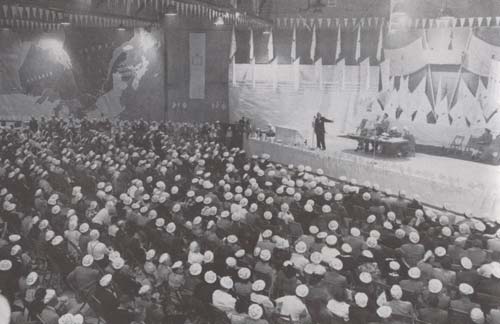
Louis Even addressing the crowd at our Congress in Quebec City in 1955
When Louis Even discovered the great light of Social Credit in 1935, he immediately understood how this solution would put into application Christian principles of social justice in economics, especially those regarding the right of all to the use of material goods, the distribution of the daily bread to all, through the allocation of a social dividend to every human being. This is why, as soon as he came across this light, Louis Even made it his duty to make it known to all.
On July 3, 1980, in Sao Paulo, Brazil, John Paul II addressed 150,000 workers as follows:
“An essential condition is to provide the economy with a human meaning and logic. It is necessary to free the various fields of existence from the dominion of subjugating economism. Economic requirements must be put in their right place and a multiform social fabric must be created, which will prevent standardization. No one is dispensed from collaborating in this task… Christians, wherever you are, assume your share of responsibility in this immense effort for the human restructuring of the city. Faith makes it a duty for you.”
It is a duty and an obligation for every Christian to work for the establishment of a better economic system, and the Pope points out that “no one is dispensed from collaborating in this task.” And this, even if this task turns out to be difficult, writes John Paul II. (It cannot be any other way, since when one attacks the monopoly of the controllers of money and credit, one attacks the greatest power in this world.) In spite of the lack of understanding, annoyances and opposition of all kinds, there should be no room for discouragement, since this task is “urgent and necessary,” as it was previously said:
“Anyone wishing to renounce the difficult yet noble task of improving the lot of man in his totality, and of all people, with the excuse that the struggle is difficult and that constant effort is required, or simply because of the experience of defeat and the need to begin again, that person would be betraying the will of God the Creator.” (John Paul II, Encyclical Letter Sollicitudo Rei Socialis, n. 30.)
The most fundamental reason every Christian must work for the establishment of a better economic system is that one will precisely be judged on what one will have done for our brothers and sisters in need. Jesus identified Himself with those who suffer, as it is written in the Gospel: “Truly, I say to you, as you did it to one of the least of these my brethren, you did it to me” (Mt. 25:40). The Christian faith teaches us to see Christ in each of our brothers, and to love our neighbour as we love Christ.
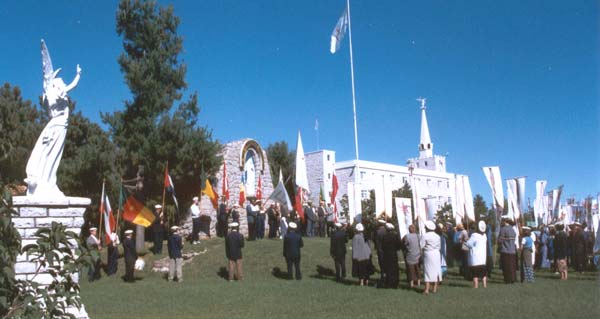
Rosary procession on our grounds during our monthly meetings in Rougemont, Que.
There are, of course, many ways to help our brothers in need: feeding the hungry, giving drink to the thirsty, sheltering the homeless, visiting the imprisoned and the sick, etc. Some will send donations to charitable organisms, whether to help the poor of our country or of the Third World. But if these donations can relieve a few poor people for a few days or weeks, they nevertheless do not suppress the causes of poverty.
What is much better is to correct the problem at its root, to attack the very causes of poverty, and to re-establish every human being in his rights and dignity of a person created in the image of God, and being entitled to a minimum of earthly goods. And to give to each one what is due to him is precisely what justice consists in:
“More than any other, the individual who is animated by true charity labors skillfully to discover the causes of misery, to find the means to combat it and to overcome it resolutely. A creator of peace, he will follow his path, lighting the lamps of joy and playing their brilliance and loveliness on the hearts of men across the surface of the globe, leading them to recognize, across all frontiers, the faces of their brothers, the faces of their friends.” (Paul VI, Encyclical letter Populorum Progressio on the development of peoples, n. 75.)
Louis Even had discovered the cause of the misery of the people — the creation and control of money by private banks — and also the means to combat this swindle: the education of the people.
The Financiers, rightly fearing that the implementation of Douglas’s ideas would put an end to their monopoly of the control of money and credit, tried everything to silence the voices of Douglas and Louis Even, either by making sure that no media spoke about Social Credit, or if they did, they did so by distorting it in order to ridicule it. The Financiers even managed to deceive many by creating a “Social Credit Party” to make people falsely believe that the only way to get the implementation of the Social Credit principles was to vote for a party labeled “Social Credit,” whereas the creation of this new party actually only served to close the minds of the people to this idea.
To make sure that the authentic Social Credit message may reach the population, and above all because his heart was filled with a great charity for his neighbour, Louis Even went as far as to quit his job right in the middle of the Depression in 1935, to found his own journal, “Vers Demain”, and to give all of his time and being to the cause of justice, literally becoming a “pilgrim” along the roads of our country, to make the great light of Social Credit known to his brothers and sisters, his example and self-dedication bringing other apostles to follow him.
Louis Even was not only a genius, but also a matchless apostle, and it is for this reason that the Movement he founded managed to go through every persecution imaginable, self-dedication being more powerful than all the millions of the Bankers. One can read in the Gospel: “greater love than this no man has, that a man lay down his life for his friends” (John 15:13); this is actually what Louis Even did: not only did he preach charity and justice, but he also lived what he preached.
The Popes said that the transformation of the economic structures will be obtained only through the apostolate, self-dedication and the sacrifices made for the love of one’s neighbour, and this is exactly the method put forward by Louis Even with his Work of the “Pilgrims of Saint Michael”:
“These attitudes and ‘structures of sin’ are only conquered — presupposing the help of divine grace — by a diametrically opposed attitude: a commitment to the good of one’s neighbour”. (John Paul II, Encyclical Letter Sollicitudo Rei Socialis, n. 38.)
John Paul II also speaks about the necessity of divine grace in this battle for justice, and this is what Louis Even understood since the very beginning: there is no justice possible without God. Besides, Social Credit is much more than a mere monetary reform: it is a system based on the order wanted by God. Douglas already said that the words “social credit” also define what binds society together (“credit” is another word for “faith” or “confidence”) — the mutual trust or belief in each other which allows one to exchange goods, and to circulate freely without the fear of being attacked on the street, or of being robbed by one's neighbour. If the Ten Commandments of God are not respected, there is no order or life possible in society.
But divine assistance is especially needed when one knows that the real aim of the Financiers is the establishment of a world government — which includes the destruction of Christianity and of the family — and that the promoters of this “New World Order” are actually led by Satan himself, whose sole aim is the ruin of souls. Back in 1946, C.H. Douglas wrote the following, in the Liverpool periodical The Social Crediter:
“We are engaged in a battle for Christianity. And it is surprising to see in how many ways this is true in practice. One of these ways goes almost unnoticed — except in its deviations — the emphasis put by the Roman Catholic Church on the family, against the implacable and continuous effort of the Communists and Socialists — who, together with the International Financiers, form the true body of the Antichrist — to destroy the very idea of the family and substitute the State for it.”
And Louis Even wrote on the same subject, in 1973:
“Yes, the Pilgrims of St. Michael are patriots, and they wish, as much as anyone else, a regime of order and justice, of peace, of bread and of joy, for every family in their country. But since they are Catholics too, they know very well that order, peace and joy are incompatible with the rejection of God, the violation of His Commandments, the denial of faith, the paganization of life, the scandals given to children in schools where the parents are, by law, constrained to send them.
“The Pilgrims of St. Michael, relying on the help of the celestial powers, swore to use all of the physical and moral forces, all of the propaganda and educational tools they have, to replace the Kingdom of Satan by the Kingdom of the Immaculate and Jesus Christ.
“In an engagement against the financial dictatorship, one does not deal only with terrestrial powers. Like the Communist dictatorship, like the powerful organization of Freemasonry, the financial dictatorship is under the command of Satan. Simple human weapons will never be able to overcome that power. What is needed are the weapons chosen and recommended by She who vanquishes all heresies, She who must definitely crush the head of Satan, She who declared Herself, at Fatima, that Her Immaculate Heart will triumph in the end. And these weapons are: the consecration to Her Immaculate Heart, marked by the wearing of the Scapular, the Rosary, and penance.
“The Pilgrims of St. Michael are assured that, by embracing Mary’s program, every act they perform, every ‘Hail Mary’ they address to the Queen of the World, and every sacrifice they offer up, not only contribute to their personal sanctification, but also to the coming of a sounder, more humane and more Christian social order, like Social Credit. In such a program received from Mary, everything counts, and nothing is lost.”
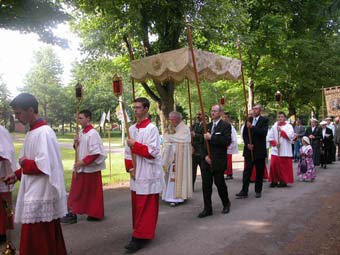 |
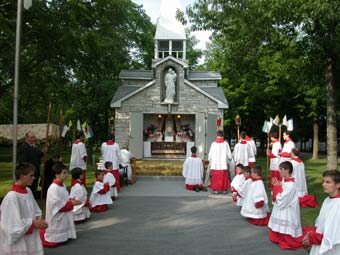 |
Pictures of our Corpus Christi procession on our grounds in Rougemont on June 22, 2003
That’s where one sees all the importance and greatness of the “Rosary Crusade” instituted by Louis Even, which consists in visiting families to have them pray a decade of the Rosary with us, and then to present to them our “Michael” Journal. Louis Even, who had been himself consecrated to Mary since the age of 17, understood all the importance of the devotion to the Blessed Virgin for the present times.
The door-to-door Rosary Crusade is an incomparable school that forms apostles who learn how to dedicate themselves for the love of their neighbours. It is through our example that the people see that our message is true. And besides giving to the people the beautiful light of Social Credit, we strengthen them in their Catholic faith, which is more than urgent in front of all the sects that go around and gain too much ground. Moreover, the Blessed Virgin also said at Fatima that “many souls are lost because there is no one who makes sacrifices for them.” The Rosary Crusade is an excellent way to make penance and sacrifices for the salvation of souls.
One can see now how wrong are those who say: “Oh, me, I take no interest in economics, in working for social justice and in changing the financial system; this is all material stuff. I am interested in spiritual things, in moral renovation. I pray to the little Jesus, and that’s quite enough.”
Prayer is certainly necessary, but if there is the great commandment of love of God, there is also the commandment of love of neighbour: it is a twofold commandment, one cannot be separated from the other, one cannot be opposed to the other — all the more so since in our brother who suffers, it is Jesus Himself who suffers. What would be the use of honouring God in the church, if we let Him starve to death outside in the cold, in the person of our brother in need?
Moreover, those who pretend not to bother with material things have to feed and clothe themselves, as well as find somewhere to live, since in fact, man has a body and a soul, and therefore has both material and spiritual needs. One must therefore take care of these two topics: the reform of hearts and that of institutions. Why oppose one to the other? What prevents us from taking care of both at the same time? The “Michael” Journal neither neglects one nor the other, since it advocates an integral development of the human person, in both his spiritual and material needs.
For too many Christians, religion is limited to what is taking place within the four walls of the church, but has nothing to do with what is taking place outside, and must in no way have any influence on society. Such a reasoning may please the exploiters, the tyrants, the enemies of God and of justice, but it is also an insult to God and to the truth — the Second Vatican Council even described this “separation of faith and culture” as “one of the most serious errors of our times.”
John Paul II said that “there is no authentic faith without a search for justice” (homily in Geneva, June 15, 1982). A religion which, under the pretext that true happiness can be reached in Heaven only, tells people to take no interest in justice, and which lets gangsters and crooks do what they want, which lets people starve to death amidst plenty, is a religion that means nothing, is a religion that is not Catholic. The “Michael” Journal wants to form true Catholics, people who think and act as Catholics everywhere, in every sector of society — not only in church.
For in reality, no sector of life in society must be closed to the teaching of Christ: all the existing systems — including the economic and financial systems — must be submitted to moral laws, and put at the service of the human person. Many might remember these words of Pope John Paul II, on October 22, 1978, at the Mass marking the beginning of his Pontificate: “Do not be afraid! Open wide the doors for Christ! To his saving power open the boundaries of States, economic and political systems, the vast fields of civilization, culture and development. Do not be afraid. Christ knows ‘what is in man’. He alone knows it.”
And Pope John Paul II also said at Flueli, Switzerland, on June 14, 1984:
“As a democratic society, see carefully to all that is happening in this powerful world of money! The world of finance is also a human world, our world, submitted to the conscience of all of us; for it too exist ethical principles. So see especially to it that you may bring a contribution to world peace with your economy and your banks, and not a contribution — perhaps in an indirect way — to war and injustice!”
To sum up, the battle of the “Michael” Journal is the battle for the salvation of souls. This paper only repeats what the Pope and the Church demand: a new evangelization — to remind basic Christian principles to Christians who unfortunately forget them or ceased to put them into practice — and a restructuring of the economic systems. To be a Pilgrim of St. Michael in the Work of the “Michael” Journal is therefore the most urgent and necessary vocation for our times. Who, among our readers, will have the grace to respond to this call, to this vocation? How great and important the Work of Louis Even is!